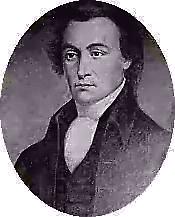Second President.
Signer of the Declaration of Independence.
Lawyer
Farmer

 John Adams was a lawyer from Massachusetts. He made his name by being a law consultant and by defending British officers after the "Boston Massacre," giving them a fair defense. He was consulted when the Royal government made changes and when taxation was changed to directly tax the colonists for the king's coffers. After the Continental Congress and signing he went to France to ask for money, left France and went to the Netherlands and secured loans from the Dutch. He then served as Ambassador to Great Britain. After three years away Adams returned and was elected as George Washington's Vice President for two terms. Adams was then elected as President for one term.
John Adams was a lawyer from Massachusetts. He made his name by being a law consultant and by defending British officers after the "Boston Massacre," giving them a fair defense. He was consulted when the Royal government made changes and when taxation was changed to directly tax the colonists for the king's coffers. After the Continental Congress and signing he went to France to ask for money, left France and went to the Netherlands and secured loans from the Dutch. He then served as Ambassador to Great Britain. After three years away Adams returned and was elected as George Washington's Vice President for two terms. Adams was then elected as President for one term.After his presidency Adams lived a quiet life with his family at his home, Peacefield. He had quarreled with Thomas Jefferson and did not attend Jefferson's Inauguration. One of only three presidents to not attend their successor's inauguration. In 1812 his friend who he had been corresponding with, Benjamin Rush, encouraged him to renew his friendship with Jefferson and urged him to write. Their friendship was renewed through letters and they corresponded until they died, on the same day, July 4, 1826.
John Adam's son, John Quincy Adams, was the 6th President of the United States, the first and only father son Presidency, until the Bushs. But other Adams family members were also politicians and lawyers, following in John's footsteps.
Adams had some very challenging issues during his presidency and vice-presidency. As the first Vice-President the lines were not clear and his duties were not outlined. Following in the footsteps of George Washington as President of the United States must have been difficult. His ideas were not popular, this was probably the reason for only one term. He had difficult decisions to make and did what he had to do. I don't particularly love or agree with his ideas, but he was a brilliant man who stood strong for what for he stood for. He was responsible for choosing Thomas Jefferson to pen the Declaration of Independence. Adams knew he was unpopular with some and saw Jefferson's genius. He is definetely worth looking into more. Watch the movie. I am going to read the book by David McCullough.












